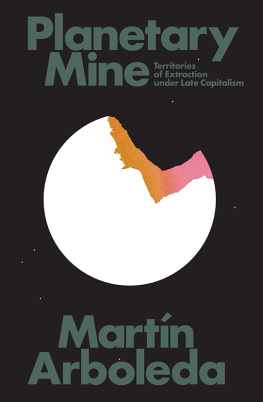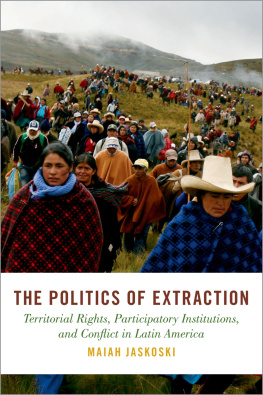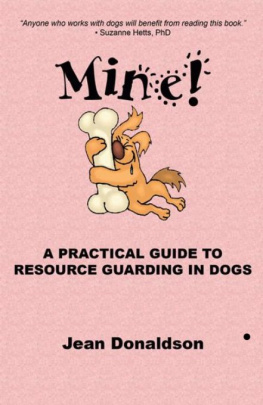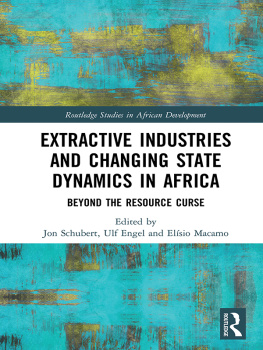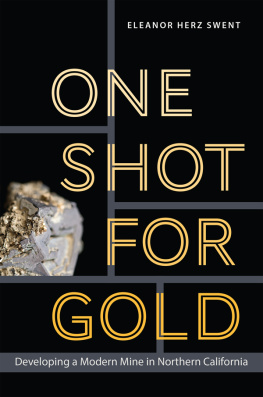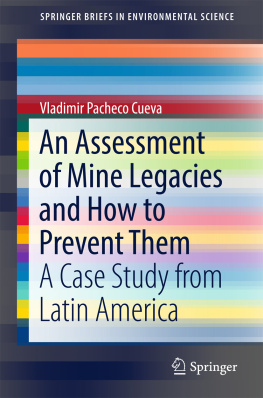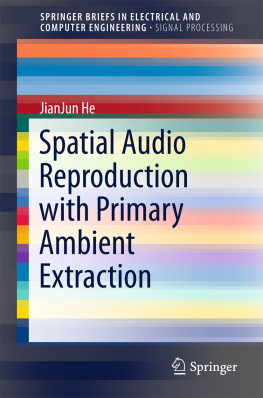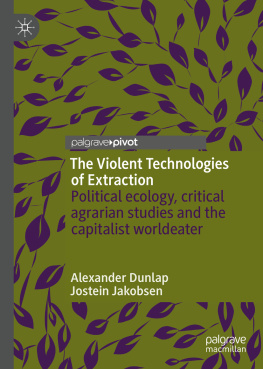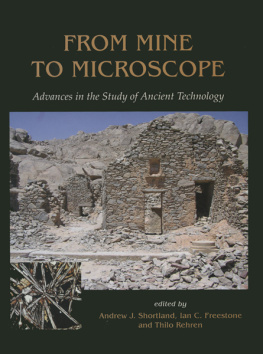Contents

Planetary Mine
Territories of Extraction under Late Capitalism
Martn Arboleda

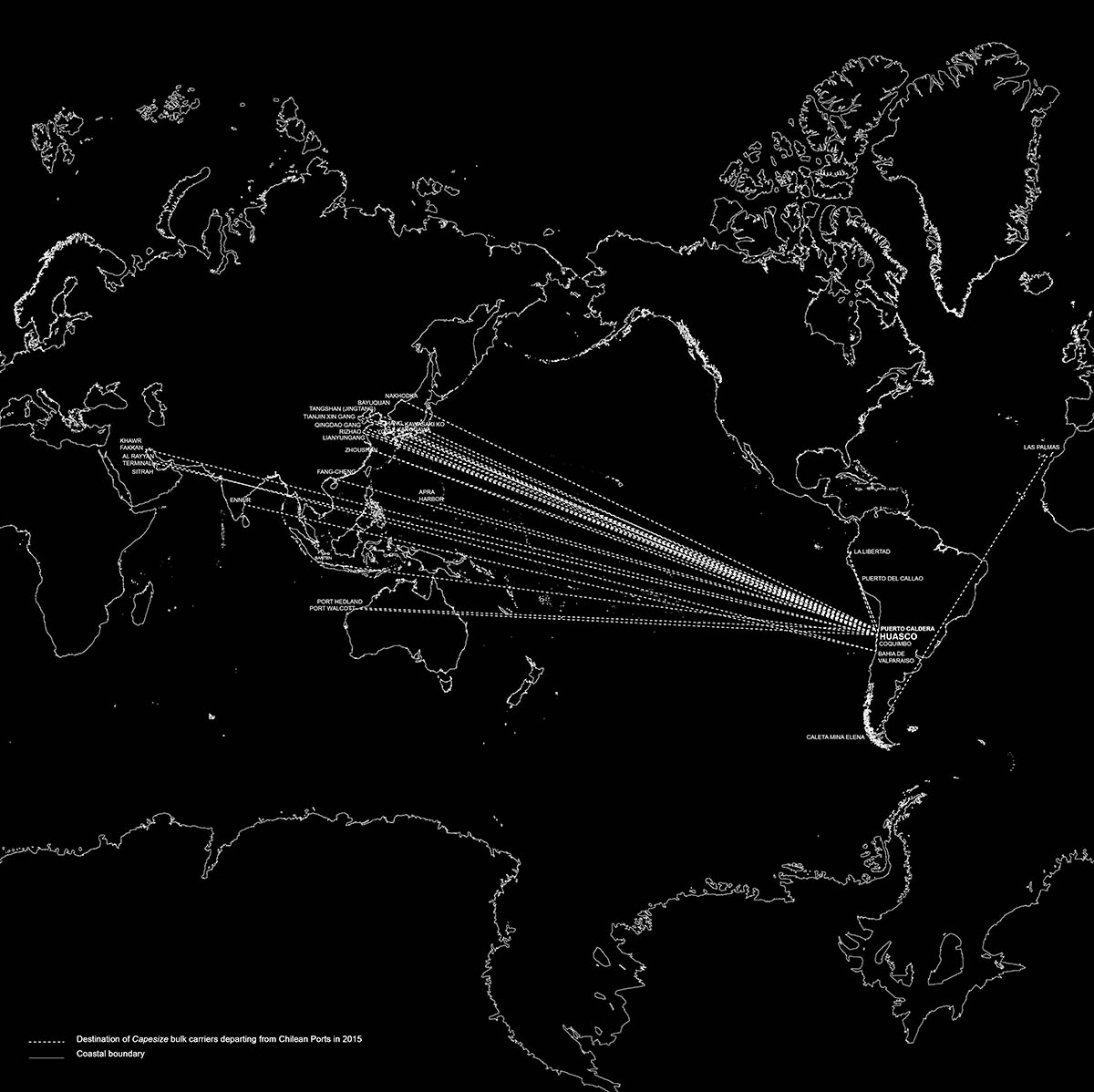
First published by Verso 2020
Martn Arboleda 2020
The map on pages vivii was produced by Carla Ferrer-Llorca with
data from the University College Londons Energy Institute.
All rights reserved
The moral rights of the author have been asserted
1 3 5 7 9 10 8 6 4 2
Verso
UK: 6 Meard Street, London W1F 0EG
US: 20 Jay Street, Suite 1010, Brooklyn, NY 11201
versobooks.com
Verso is the imprint of New Left Books
ISBN-13: 978-1-78873-296-3
ISBN-13: 978-1-78873-295-6 (LIBRARY)
ISBN-13: 978-1-78873-297-0 (UK EBK)
ISBN-13: 978-1-78873-298-7 (US EBK)
British Library Cataloguing in Publication Data
A catalogue record for this book is available from the British Library
Library of Congress Cataloging-in-Publication Data
A catalog record for this book is available from the Library of Congress
Typeset in Minion Pro by Hewer Text UK Ltd, Edinburgh
Printed and bound by CPI Group (UK) Ltd, Croydon CR0 4YY
Europe is no longer the center of gravity of the world. This is
the significant event, the fundamental experience, of our era.
Achille Mbembe, Critique of Black Reason
The machine itself makes no demands and holds out no promises:
it is the human spirit that makes demands and keeps promises.
In order to reconquer the machine and subdue it to human
purposes, one must first understand it and assimilate it.
Lewis Mumford, Technics and Civilization
I see the mountains fall, open up the territory in angry grayish
cavities, the desert, the transitory houses. The mineral on fire
and shaped and handled became military ingots, battalions of
merchandise. The ships departed. Wherever copper arrives,
utensil or wire, no one touching it will see the rugged solitudes
of Chile, or the small houses on the edge of the desert
Pablo Neruda, Ode to Copper
Table of Contents
_________________________
OPENINGS
The Mine as Transnational Infrastructure
EMPIRE
Resource Imperialism after the West
LABOR
Bodies of Extraction and the Making of Urban Environments
CIRCULATION
State Power and the Logistics Turn in the Extractive Industries
EXPERTISE
Technocracy and Expropriation
MONEY
Debts of Extraction
STRUGGLE
Plebeian Consciousness and the Universal Ayllu
EPILOGUE
Toward an Emancipatory Science in the City of Extraction
_______________________
__________________________
This book interrogates the political life of infrastructures of extraction, especially at a time when new generations of machines and integrated industrial technologies actively reweave the textures and environments of everyday life, and the Atlantic Ocean ceases to be the pivot upon which the modern world has always turned. If to be one is to become with many, as Donna Haraway suggests, this book is then far from being a conclusive statement; it is rather the embodied manifestation of an ongoing dialogue with many individuals wholike myselfhave abhorred and felt frustrated, but also captivated and heartened, by this period of great historical transformations. I have had the good fortune of being surrounded by the best colleagues, critics, and friends that anyone could have. I am deeply grateful to Neil Brenner for his encouragement, support, and guidance throughout the whole process of writing this book. During my time at Harvard University, Neil read several revisions of chapter drafts despite his incredibly busy schedule; he also mobilized tirelessly within the university and beyond so that I could have the time, space, and infrastructure required for writing this book. This book has also benefited greatly from the talent and intelligence of my colleagues at the Urban Theory Lab. Mariano Gmez-Luque, Julia Smachylo, Daniel Ibez, Ghazal Jafari, Nikos Katsikis, Mike Chieffalo, Ayan Meer, and Tamer Elshayal, have been excellent colleagues and interlocutors, and I have learned so much from them. Other colleagues at Harvard to whom I am very grateful are Stuart Schrader, Rachel Meyer, Amanda Miller, and Carla Ferrer-Llorca.
This book also owes a huge debt of gratitude to several of my colleagues at the University of Manchester. Despite having completed his role as my PhD supervisor years ago, Greig Charnock has continued to read innumerable drafts and chapter revisions, always getting back to me quickly and with incisive and thoughtful feedback. Also, Greigs efforts to revisit the New International Division of Labor (NIDL) thesis have been revelatory, and figure centrally in this book. Adrienne Roberts and Carl Death also provided very relevant guidance and mentoring. My former colleagues at the Society and Environment Research Group in Manchester, who went on to become close friends, have also contributed in one way or another to the ideas contained in this book. They are Julie Ann De Los Reyes, Melissa Garca-Lamarca, Creighton Connolly, and Daniel Banoub. Japhy Wilson and Tom Purcell have also been close colleagues and interlocutors during the time I have spent writing this book, having also offered very relevant feedback on chapter drafts. Ilias Alami made very helpful and detailed comments on one of the most difficult chapters, and for this I am very grateful.
Other fellow travelers and colleagues beyond the universities that I have been directly affiliated with, have also contributed in different ways to this intellectual journey. Alex Loftus has taken the time to read and discuss work in progress of my research across several of its iterations. His insistence on the relevance of everyday experience and situated knowledge shaped in crucial ways my own ideas about extraction and global capitalism since early on in my doctoral research. Gastn Caligaris was generous enough to send me some of the books that have emerged from the innovative theoretical work produced by the Buenos Airesbased Centro para la Investigacin como Crtica Prctica (CICP). Jason W. Moore has been very supportive throughout the whole process, and invited me to present some of the ideas of this book at the 2017 World-Ecology Conference in Binghamton, United States. Nicole Aschoff helped me to think through the intersections between the mining industry and the electronics industry. Mazen Labban introduced me to Enrique Dussels pathbreaking study on Marxs manuscripts of 186163, which was formative as I revised some of the key chapters of the book. Mazens own work has also been a source of inspiration, and this book is a collegial attempt to take forward in new directions his lucid call to rethink mineral extraction beyond the extractive industries.
My field research in Chile also benefited greatly from the generosity of many individuals. I am particularly thankful to Patricia lvarez, Valeska Urqueta, Cristian Ochoa, Andrea Cisternas, Juan Carlos Labrn, Soldad Fuentealba, Jorge Guerrero, Javier Karmy, Consuelo Infante, and Lucio Cuenca. Mark Muller, Ixent Galpin, Andy Higginbottom, and Richard Solly, from the London Mining Network, were also very friendly and keen to help with the development of this research, when it was still at an early stage. The Urban Studies Foundation (USF) generously funded this research with a postdoctoral fellowship that allowed me to have almost exclusive dedication to the book project for a period of two years. More than a mere funding body, the Urban Studies Foundation is an institution enlivened by wonderful individuals who are genuinely committed to fostering the professional and intellectual development of their fellows. I especially want to thank Chris Philo, John Flint, Ruth Harkin, Donald McNeill, Neil Gray, and Joe Shaw, for being so generous, open, and flexible during the time I was a USF fellow. At Verso, I thank Sebastian Budgen for his interest in this book, and Duncan Ranslem for all the support he provided during crucial moments of copyediting and production.

